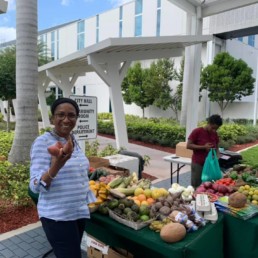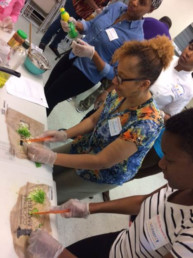Overview
Healthy eating and improved nutrition start by making nutrient-rich, healthy food choices (foods with large amounts of vitamins and minerals with fewer calories) across all of the food groups. Choosing a variety of nutrient-rich foods as the foundation of what you eat can help you live a longer, healthier life. Healthy eating should be about positive choices, focusing on foods that provide the nutrients you need to maintain good health.
Through a Community Check-In surveys and focus groups process conducted by LHMG in 2014, residents rated unhealthy eating as the second greatest health problem in Miami Gardens. By age group, our residents ranked poor nutrition as the greatest problem facing children and obesity as the greatest problem facing older adults. Residents also identified lower number of access points of affordable healthy foods (fruits and vegetables as well as lower fat and whole grain items) and the high cost of healthy foods in the top five access/affordability issues.


Strategies
- Increase the number of corner/convenience stores, gas stations, mobile vendors, grocery stores, and other retail food vendors that offer affordable, healthy, nutritious food including fruits and vegetables.
- Increase healthy menu options and promotion of those options at Miami Gardens non-chain restaurants.
- Improve and promote access to fresh fruits and vegetables through a Mobile Farmers Market.
- Offer cooking classes and demonstrations to increase food and cooking knowledge that promotes healthy eating.
- Promote healthy eating through the implementation of a city-wide wellness and healthy food policy for all city events and activities.
- Work in collaboration with Miami-Dade County Public Schools to help implement, support and reinforce nutrition and healthy eating wellness policies in the schools in Miami Gardens.
- Establish healthy nutrition standards in key institutions such as hospitals, afterschool and recreation programs, community health centers, faith-based organizations, food banks/pantries, and early care and education centers.
- Improve nutrition and increase access to healthier food for Miami Gardens residents by working with food vendors, distributors and producers to enhance healthier food procurement and sales; establishing and supporting food hubs; and establishing a group purchasing collective.
- Improve nutrition and increase access to healthier food for Miami Gardens residents by making improvements to local programs/systems (e.g., voucher incentive programs, increased electronic benefit transfer acceptance where food is purchased, improved public transportation routes to food stores, access to healthier foods at community venues).
- Increase awareness of and reduce hunger in Miami Gardens by expanding summer and afterschool meal sites; increasing school breakfast participation; and increasing resident access to SNAP and WIC.


Healthy Corner Store Project
Healthy Food Procurement Project
Accomplishments to Date
- Trained over 1,000 residents in cooking classes/demonstrations to increase food and cooking knowledge and promote healthy eating.
- Successfully recruited and trained four community-based organizations within the City of Miami Gardens to deliver the national evidence-based Cooking Matters Program. The four organizations trained were: YWCA Miami, Jessie Trice Community Health System, Center for Family and Child Enrichment and The Resource Room. Together, they reached over 400 individual and family members of the Miami Gardens community through Cooking Matters. The Cooking Matters Train-the-Trainer course was also very successful in helping families to shop for and cook healthy meals on a budget, as part of Share Our Strength’s No Kid Hungry campaign. During conducted store tours, participants learned how to read food labels, compare unit prices, find whole grain foods, and identify ways to purchase produce. Participants gained hands-on experience making healthy meals and learned about the benefits of healthy eating, modifying recipes, cooking tips and shopping on a budget.
- Worked in collaboration with Miami-Dade County Public Schools to help implement, support and reinforce nutrition and healthy eating wellness policies in 25 Miami Gardens schools.
- Established three fully operational Food Forests at elementary schools in Miami Gardens, resulting in: Food Forests producing enough crops for students to take 4,440 harvest bags or two tons of fresh produce home; Teachers implemented 500 lessons using the Food Forests to conduct weekly learning activities; Cafeterias utilized the produce harvested in their recipes; and Parents were trained to be health advocates.
- Supported the Universal Free Breakfast Program across 25 schools in Miami Gardens to increase the number children starting their day with a healthy meal.
- Improved the nutrition environment in after-school programs by working with 21 out of school sites in Miami Gardens to implement national Healthy Eating Physical Activity (HEPA) standards. As a result, 86% of these sites achieved 50% HEPA Standards compliance.
- Conducted a feasibility study to identify restaurants and analyze their interest and readiness to participate in a Healthy Restaurant program.
- Incorporated best practices relating to physical activity and access to healthy foods into the City’s Comprehensive Development Master Plan.
- Worked with the City Manager’s office and City Council to pass a city-wide wellness and healthy food ordinance to promote healthy food for all city events and activities.
- Executed an integrated citywide Anti-Hunger Campaign featuring Mayor Oliver Gilbert as Champion to raise awareness of and address hunger in Miami Gardens and encourage the community to take action, resulting in: an increase the number of sites participating in the federal meals program in the city from 61 to 67; an increase in the number of sponsors participating in the federal meals program in the city from 11 to 14; in increase in the Average Daily Participation (ADP) of afterschool meals by 12% from the baseline ADP of 1978 meals in 2018, to an ADP of 2220 meals in 2019-2020; an increase in the number of sites serving Afterschool Meals Program (AMP) in the city from 26 sites in the 2017-2018 school year, to 32 sites in 2018-2019, and 33 sites in 2019-2020; an increase in the number of Miami Gardens residents receiving SNAP (Supplemental Nutrition Assistance Program) benefits by 403; and converted the Mt. Pisgah’s traditional food pantry into a Food Choice pantry to improve client experience and reduce food waste.